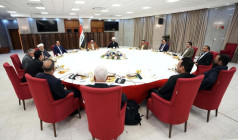Iraq’s Pharmaceutical Crisis: shortages, counterfeit drugs, and ineffective reforms

Shafaq News/ In a small pharmacy on the outskirts of Baghdad, Suhad Abdul-Amir nervously scanned the shelves for medication her child desperately needed. The price had skyrocketed from 3,000 to 7,000 Iraqi dinars ($2 to $5) in just a few days. For Abdul-Amir, the rising costs were a harsh reminder of the severe crisis plaguing Iraq’s pharmaceutical sector, a crisis driven by chronic shortages, inflated prices, and a rampant influx of counterfeit drugs.
Her story, like those of millions of Iraqis, is a consequence of years of corruption, economic instability, and poor regulation that have left countless patients unable to access the essential medications they need.
Depth of Crisis
Iraq’s pharmaceutical sector is in a state of collapse, with millions of Iraqis unable to afford or access the most basic of medications. The problem has persisted for years but worsened in the past decade due to weak government oversight, economic instability, and widespread corruption. The absence of a centralized pricing system allows intermediaries to manipulate drug costs, inflating prices and making life-saving treatments unaffordable for the majority.
To complicate matters, outdated intellectual property laws have discouraged foreign pharmaceutical companies from entering the market, further limiting access to high-quality drugs. Bureaucratic inefficiencies and procurement delays disrupt supply chains, leading to regular shortages. State-run institutions such as Kimadia, responsible for pharmaceutical procurement, are notorious for mismanagement and corruption, which has only exacerbated the problem. As a result, hospitals regularly run out of critical medications, forcing patients to turn to private pharmacies where prices are unregulated.
“The shortage of drugs has persisted for decades,” Mohan Al-Saadi, a member of the Parliamentary Health and Environment Committee, told Shafaq News. Al-Saadi attributed the crisis to “the lack of a comprehensive monitoring system and irregular imports through Kimadia.” But this crisis is not just about supply failures—it also involves deep-seated issues with the pharmaceutical market, including the presence of counterfeit drugs.
“Manufacturers ceasing production, pricing mismatches, and the introduction of alternative drugs contribute to these fluctuations,” explained Osama Hadi Hamid, spokesperson for the Iraqi Pharmacists Syndicate.
Role of Counterfeit Drugs
Counterfeit drugs represent a significant portion of the pharmaceutical market in Iraq. According to some estimates, as much as 35% of the drugs circulating in Iraq are either counterfeit or illegally imported. The proliferation of counterfeit drugs, often manufactured in countries with weak regulations, puts vulnerable patients at greater risk. These drugs are often substandard or contain harmful ingredients, leading to treatment failures, adverse reactions, or even death.
A Health Ministry official, speaking anonymously, revealed that “companies sometimes prioritize more expensive medications over affordable alternatives for higher profit margins,” exacerbating the problem.
Smuggling also plays a key role in the influx of counterfeit and substandard medications. Some drugs are smuggled in from neighboring countries, bypassing inspections and regulatory controls. This influx undermines the government’s efforts to regulate the market and protect consumers.
Impact on Citizens
The impact of these shortages and the spread of counterfeit drugs is devastating, particularly for individuals with chronic health conditions. Cancer patients face ongoing chemotherapy shortages, diabetics struggle to find insulin, and families with children suffering from rare diseases must resort to crowdfunding to afford essential treatments.
The situation is particularly dire for Iraq’s rural and low-income communities, where access to pharmacies is limited and patients are left with little choice but to turn to expensive private pharmacies or the black market.
Mehdi Sahib, a patient who relies on the antidepressant Tryptizol, experiences the consequences of the drug shortages firsthand. “I frequently face gaps in supply,” Sahib told Shafaq News. “The medication also serves as a sedative for some people without prescriptions, which leads to periodic withdrawals from the market.”
As for Abdul-Amir, the mother whose child’s medication price nearly doubled, her story highlights the cruel irony faced by many Iraqis: while their needs are urgent, the prices for essential drugs continue to soar.
Government Response, Ongoing Challenges
In 2023, the Iraqi government introduced the Kodia digital tracking system in an attempt to curb the rise of counterfeit drugs and regulate the pharmaceutical supply chain. The system was designed to track medications from the moment they enter Iraq to the point they reach consumers, aiming to prevent the distribution of substandard or counterfeit drugs. However, despite the system’s potential, drug shortages persist, and its effectiveness has been undermined by slow implementation and persistent market manipulation.
In addition to the Kodia system, the government has worked to tighten border controls and partnered with organizations like the World Health Organization (WHO) and INTERPOL to improve drug detection. Al-Saadi, the parliamentary health committee member, stressed that Iraq has implemented strict regulations requiring all imported drugs to undergo thorough inspection at the Pharmaceutical Control Center. “Before a drug can be imported, it must first be registered with the Ministry of Health,” he affirmed.
The government has also attempted to regulate drug prices. “The percentage of currently priced medications has exceeded 70%,” Al-Saadi noted.
Despite these efforts, shortages continue, and doubts about the government’s ability to enforce reforms remain. The system is bogged down by bureaucratic inefficiencies, and even when regulations are put in place, they often fail to prevent corrupt practices or stop the flow of counterfeit drugs into the market.





